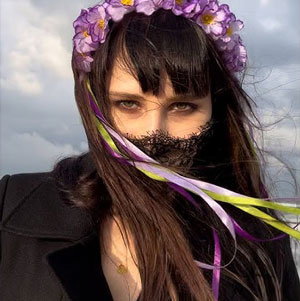Eilatan’s “Happy Face” is a haunting and introspective pop-rock ballad that ventures into the darker sides of personal identity, societal pressures, and emotional resilience. Her youthful yet perceptive lyrical exploration captures a universal theme: the dissonance between outward appearances and inner turmoil. At just 20 years old, she brings a surprising depth to her songwriting, using metaphor and stark honesty to build a narrative that feels both personal and relatable.
The song opens with a bitter reflection on the external pressures to appear happy, with “boring creatures” representing the societal norms that insist on maintaining a façade of cheerfulness, even in the most oppressive circumstances. Eilatan’s characterization of these figures as “boring” suggests a disdain for the emotional conformity they impose, while “dark, cold place” highlights the suffocating environment from which her discontent springs. This sets the tone for the entire track, positioning the act of smiling as not only superficial but as something that could lead to an emotional breaking point.
Her introspection deepens as the song unfolds, particularly in the line where she describes the “small devils” in her head. This metaphor serves as a striking way to portray the intrusive, self-destructive thoughts that accompany her inner struggle. The use of the word “devils” underscores the torment of constantly battling with mental health issues while being told to simply smile through it. It’s a poignant commentary on how forced positivity can exacerbate feelings of isolation and despair, rather than alleviate them.
In the chorus, Eilatan addresses an unnamed figure who seems to be a source of frustration and emotional exhaustion. She accuses this person of conducting “integration experiments,” which could be interpreted as an attempt to force her to fit into some pre-defined mold of happiness or normalcy. The word “experiments” evokes a sense of violation, as though her emotions and individuality are being prodded and tested without her consent. There’s a clear resentment toward this person’s persistent question of why she’s not happy, which speaks to the often-repeated societal demand for women (especially young women) to mask their true feelings behind a smile. The final lines of the chorus deliver a powerful emotional punch, as she asserts that only in this person’s absence can she reclaim her “happy face” – revealing that her compliance with these societal expectations is a forced performance, one that fades the moment she’s free from their scrutiny.
 The third verse takes a broader view, examining the contradictions of the world around her. Eilatan’s observation that “people kill people, then they go and cry for them” is a cutting critique of human nature and societal hypocrisy. It’s a jarring juxtaposition that reveals her disillusionment with a world that doesn’t seem to practice what it preaches. This line not only reflects her inner chaos but also connects it to the larger, more existential crises she sees around her. Her sharp observation of the duality of humanity – capable of both cruelty and remorse – mirrors her own internal conflict of being expected to show one emotion while feeling something entirely different.
The third verse takes a broader view, examining the contradictions of the world around her. Eilatan’s observation that “people kill people, then they go and cry for them” is a cutting critique of human nature and societal hypocrisy. It’s a jarring juxtaposition that reveals her disillusionment with a world that doesn’t seem to practice what it preaches. This line not only reflects her inner chaos but also connects it to the larger, more existential crises she sees around her. Her sharp observation of the duality of humanity – capable of both cruelty and remorse – mirrors her own internal conflict of being expected to show one emotion while feeling something entirely different.
The declaration, “I’m not the same sweet princess you thought you knew,” marks a moment of personal evolution. Eilatan rejects the passive, innocent persona that others might have projected onto her. She no longer identifies with the image of sweetness and innocence, instead embracing a hardened wisdom borne out of painful experiences. The line “you have to be the wolf or the wolf devours you” reinforces her newly formed worldview – one that necessitates strength, aggression, and survival in a cruel and indifferent world. It is a significant moment in the song, where the metaphor of the wolf emphasizes her defiance and determination to no longer be prey to others’ expectations.
The song closes with an almost cathartic repetition of the chorus, this time with a subtle shift in emotional tone. The refrain “when you are here I owe you again so many explanations” underscores the weariness of constantly having to justify her unhappiness. In contrast, the relief she feels when this person “disappears” is palpable, as it signals the freedom to exist without the weight of others’ expectations. This final sentiment encapsulates the emotional heart of the song – the idea that true happiness, or at least peace, can only be found when one is no longer burdened by the pressures to conform to superficial societal norms.
Musically, “Happy Face” complements its lyrical depth with a slow-burning intensity that gradually builds, much like the emotional arc of the song itself. Eilatan’s delivery is both vulnerable and raw, her voice carrying the weight of the song’s emotional contradictions. The production leans into cinematic pop-rock, with swelling instrumentation that underscores the sense of drama and inner conflict, making the song feel almost like a soundtrack to a climactic personal moment.
In conclusion, “Happy Face” is a sophisticated and stirring debut from Eilatan, highlighting her ability to translate personal struggle into a broader commentary on societal expectations and emotional repression. Through rich metaphors and an unapologetic approach to vulnerability, she crafts a song that resonates with anyone who has ever felt pressured to put on a mask to fit in. It’s a song about reclaiming agency over one’s own emotional expression, even in a world that demands constant happiness.
OFFICIAL LINKS: SOUNDCLOUD – X – YOUTUBE – TIKTOK

